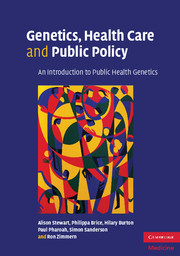6 - Ethical, legal and social implications of genetics
Published online by Cambridge University Press: 19 January 2010
Summary
No book about the role of genetics in health care would be complete without a discussion of the ethical, legal and social implications (often shortened to the acronym ‘ELSI’) of genetic science. Hardly a week goes by without debate about the possible moral and social consequences of our greater understanding of – and perhaps also temptation to meddle with – our genetic make-up.
In this chapter, we discuss those aspects of genetics that have led to its current position in the spotlight of such intense ethical scrutiny. In general, we concentrate on the conceptual issues and arguments, while the options for the development of public policy on these issues may be found in Chapter 7. However, there is inevitably some overlap and readers interested in a particular issue should consult the relevant sections of both chapters for a full picture.
While not underestimating the importance of ethical, legal and social concerns raised by genetics, we try to approach them within the framework of an understanding of genes as an important, but by no means the only, factor affecting health and other human characteristics. Many of the current concerns that have been raised about genetics can, we believe, be at least to some extent allayed if we avoid the twin pitfalls of genetic determinism and genetic reductionism.
Genetic determinism and reductionism
Genetic determinism is the belief that it is our genes, and only our genes, that ‘make us who we are’.
- Type
- Chapter
- Information
- Genetics, Health Care and Public PolicyAn Introduction to Public Health Genetics, pp. 186 - 224Publisher: Cambridge University PressPrint publication year: 2007



